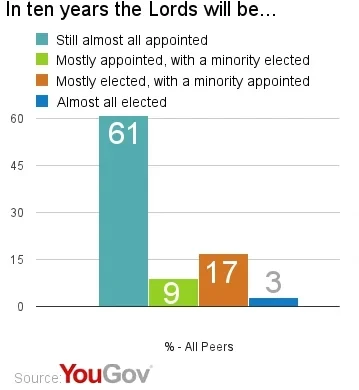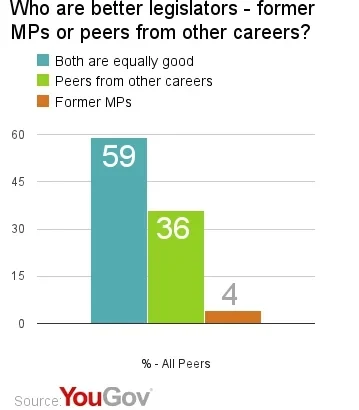YouGov takes an exclusive insight into the House of Lords, finding its members doubtful of reform for their chamber – and much more likely to prefer peers from other careers to former MPs
One of the oldest and most prestigious parliamentary chambers in the world, the House of Lords has for centuries acted as a check on governmental power, scrutinising and restraining the Executive. It is also one of the most controversial chambers, however – democracy itself requires the public election of officials, yet the public votes for no member of the Lords. So what should happen to the Lords, and who, in any case, should get to be a peer?
Exclusive research conducted by YouGov takes a rare insight into the views of members of the House of Lords, in a representative poll of 100 peers on the future of their chamber.
Lords Reform

Apart from Labour’s expulsion in 1999 of all but 92 hereditary peers, efforts to reform the House of Lords have been largely unsuccessful. Only last year, Liberal Democrat plans to make the House mostly elected were blocked by Conservative rebels. 61% of peers now predict the House of Lords will still be mostly appointed ten years from today.
Only 17% predict the Lords will be mostly elected, with a minority appointed, though Liberal Democrat peers – whose party are the biggest advocates of constitutional reform – are most hopeful. 38% of them predict a mostly elected chamber.
Career Peers?
A common complaint against mainstream politics is that so many MPs have never had a ‘proper job’, with some attributing the rise of UKIP to the impression that leader Nigel Farage is “unlike career politicians”.

But how does this translate to the Lords – can a politician be a good peer, or does that require wider life experience too?
Although the majority of Lords (59%) say former MPs and peers from other careers are equally good legislators in the chamber, 36% say peers with experience outise of politics are better than former MPs while only 4% see former MPs as the better legislators.
Crossbench peers – those not affiliated to any party represented by MPs – are less likely to say both are equally good, and a majority (54%) say peers from non-parliamentary backgrounds are best.
There are now 781 peers, and only around 400 seats, making the Lords the world’s second largest decision-making body after China’s. The Electoral Reform Society even predict that there could be as many as 2,000 after the next general election, and call for the numbers to be reduced greatly.







